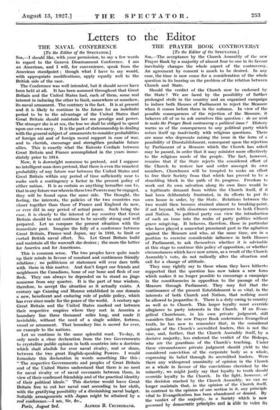Letters to the Editor
THE NAVAL CONFERENCE
[To the Editor of the SPECTATOR.] should like, with your permission, to say a few words in regard to the Geneva Disarmament Conference. I am an American, and I will, for convenience, speak from the American standpoint ; though what I have to say would, with appropriate modifications, apply equally well to the British side of the case.
The Conference was well intended, but it should never have been held at all. It has been assumed throughout that Great Britain and the United States had, each of them, some real interest in inducing the other to limit, somewhere or somehow, its naval armament. The contrary is the fact. It is at present and it is likely to continue in the future for an indefinite period to be to the advantage of the United States that Great Britain should maintain her sea prestige and power. The stronger she is at sea, the less we shall be obliged to spend upon our own navy. It is the part of statesmanship in dealing with the general subject of armaments to consider probabilities of foreign aid and of foreign moral support in case of war, and to cherish, encourage and strengthen probable future allies. This is exactly what the Entente Cordiale between Great Britain and France accomplished in the years imme- diately prior to 1914.
Now, it is downright nonsense to pretend, and I suppose no intelligent man does pretend, that there is even the remotest probability of any future war between the United States and Great Britain within any period of time sufficiently near to make such a contingency a factor in the present policy of either nation. It is as certain as anything hereafter can be, that in any future war wherein these two Powers may be engaged, they will be found upon the same side. The thought, the feeling, the interests, the policies of the two countries run closer together than those of France and England do now, or ever did in any period of actual peace. Such being the case, it is clearly to the interest of my country that Great Britain should be and continue to be navally strong and well prepared. Let us compare the present situation with the immediate past. Imagine the folly of a conference between Great Britain, France 'and Japan, say in 1910, to limit or curtail British naval effort. No. Let Great Britain build and maintain all the warcraft she desires ; the more the better for America and for Americans.
This is common sense. The two peoples have quite made up their minds in favour of constant and continuous friendly relations ; no politicians or statesmen will ever dare trifle with them in this matter. " And don't forget our friends and neighbours the Canadians, bone of our bone and flesh of our flesh. They can always be depended on to stand no jingo nonsense from any quarter. It is the part of true wisdom, therefore, to accept the situation as it actually exists. A century ago Canning and Monroe established in one domain a new, beneficent and enduring rule of public policy, which has ever since made for the peace of the world. A century ago Great Britain and the United States marked out between their respective empires where they met in America a boundary line three thousand miles long, and made it inviolable, without the need of a single soldier, fortress, vessel or armament. That boundary line is sacred for ever, an example to the nations.
Let us continue in the same splendid road. To-day, it only needs a clear declaration from the two Governments to crystallize public opinion in both countries into a doctrine which shall abolish for ever naval rivalry, real or sham, between the two great English-speaking Powers. I would formulate this declaration in words something like this : ".The respective Governments and peoples of Great Britain and of the United States understand that there is no need for naval rivalry or of naval covenants between them, in view of their confirmed friendship and of the practical identity of their political ideals." This doctrine would leave Great Britain free to cut her naval coat according to her cloth, with the gratifying possibility of a diminishing naval budget. Suitable arrangements with Japan might be attained by a real conference.—I am, Sir, &c.,






























 Previous page
Previous page